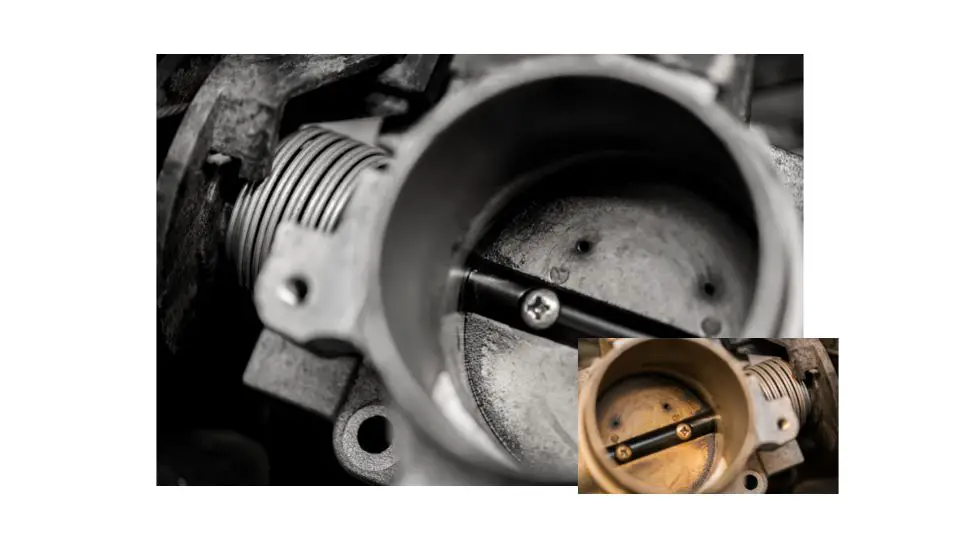Ever wonder what causes the oil in the throttle body? I have. Wondering is fine, but not knowing is bad. So in the rest of this blog post, we will look at some possible fixes, causes, and more. Keep reading.
What is a throttle body?
A throttle body is a device that controls the amount of air flowing into an engine. It’s an important part of your vehicle’s engine and is found on most internal combustion engines. The engine uses this air to burn fuel, which in turn creates energy to power the car.
The throttle body is connected to the carburetor or fuel injection system and regulates how much air flows into the engine. The valve inside a throttle body opens and closes as you press down on the accelerator pedal.
The valve controls how much air enters into the intake manifold at any given time, which determines how hard your car will accelerate. Some throttle bodies are electronically controlled, while others are mechanically controlled by cables or rods connected to them.
What causes the oil in the throttle body?
In a few words, the oil is coming from the crankcase of the engine, this can be caused by excessive crankcase pressure due to worn rings, valve seals or other internal engine problems.
The oil will drain into your intake manifold and then into your throttle body. The most common problem that causes excessive crankcase pressure is worn piston rings.
When a cylinder doesn’t receive sufficient compression, it allows oil to seep past the ring group and into the combustion chamber. This causes an increase in oil consumption and eventually may result in an oil leak down below your vehicle.
Is it Bad to have Oil in Throttle Body?
In a nutshell, yes. If there is oil in the throttle body, it could be a sign that there is a mechanical problem with the engine.
The oil may have gotten into the engine through a leaky valve cover gasket or a damaged oil dipstick tube. The engine could also have internal problems such as a cracked block or leaking head gasket.
If you notice oil in your throttle body, take your car to an auto shop as soon as possible for inspection.
Can You Drive with Oil in the Throttle Body?
You can drive with oil in the throttle body, but it’s not a good idea. When you drive with oil in your throttle body, you might notice that your car runs poorly or doesn’t run at all. You might also notice smoke coming from under the hood and see black residue on the top of the engine block.
These are signs that your car needs an engine rebuild kit because there is too much oil in your engine. The problem with driving with too much oil in the throttle body is that it causes carbon build-up inside of your engine.
This can damage pistons, valves, and other parts by building up on them over time. If you have a leaky head gasket or cracked cylinder head, you may have more than just oil in your throttle body. These leaks can cause coolant to find its way into your intake manifold which makes for a bad situation for sure!
Can oil in the throttle body cause a misfire?
Yes, it could be a cause for your misfire. If the oil level is too high in the throttle body, it can cause carbon buildup on the throttle plate and other surfaces resulting in poor throttle response. The PCV valve is designed to let air into the crankcase when the engine is idle.
This causes excess oil to be pushed out of the engine through the PCV valve and into the throttle body. If you have a misfire condition, you may want to check your PCV valve to see if it has been plugged with carbon buildup or if it has failed. If so, this can be easily replaced by any automotive parts store.
What to do if you see oil in the throttle body?
If you see oil dripping from your car’s engine compartment, check the throttle body first to see if it’s leaking.
This will allow you to determine what kind of repair work needs to be done and whether or not you need to take your vehicle into a shop for service.
If an oil leak isn’t coming from the throttle body, but instead is coming from another component in your engine, such as the valve cover gasket or head gasket, then you’ll need to have those components replaced before they cause further damage to other parts of your car and lead to expensive repairs down the line.
I hope this article has helped to clear up any confusion about oil in throttle bodies. If you have any further questions, feel free to leave a comment

Robert Anderson is a world class motorhead who rebuilt his first carb at age 10, his first engine at age 15, and completed his first full hotrod build when he was just 18! Previously, he has ran a part warehouse, delivered pizzas, and managed the service department for a $20 million/year revenue dealership. Robert knows cars like few others and he is passionate about sharing his knowledge.

